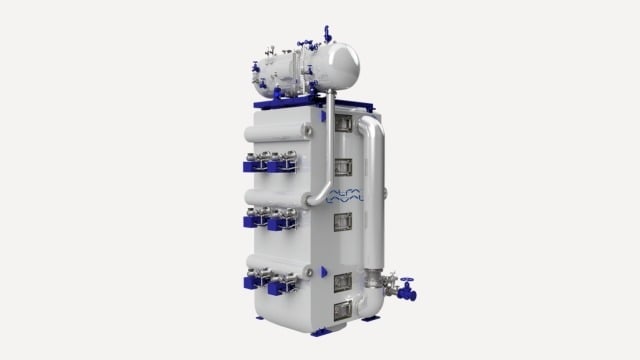Maximized waste heat recovery at multi-pressure levels on Icon of the Seas
Energy efficiency is a key priority for Royal Caribbean Group. On Icon of the Seas — the world’s best family vacation built at Meyer shipyard in Turku, Finland — this ambition is brought to life through advanced Alfa Laval Aalborg exhaust gas boilers. By capturing and reusing engine waste heat, the system significantly reduces fuel consumption and CO₂ emissions, supporting both environmental targets and operational efficiency.
DATE 2025-09-30Up to 33% increase in heat recovery achieved
Typically, a conventional waste heat recovery system recovers engine exhaust heat down to around 230 - 200°C. On Icon of the Seas Alfa Laval has now pushed the limits down to around 140°C, meaning an improvement of up to 33% waste heat recovered with our advanced dual-pressure stage (3 and 8 bar) natural circulation exhaust gas boilers.
Maximized heat recovery not only ensures continuous heat and electricity production during cruising but also enhances heat generation from waste heat while at pier, thereby minimizing operation of the fired boilers
Multi-pressure levels maximizing thermal efficiency with electrical output of 2.5 MWe
Heat recovery onboard Icon of the Seas is optimized at dual pressure levels - an innovation in the marine sector - with the higher-pressure level incorporating steam superheating. This configuration is not only to meet the vessel’s heat demands, but it is also used to generate electricity from the steam turbine generator. The exhaust gas waste heat recovery system is probably the most efficient so far in any cruise vessel.
CO₂ emission savings
The system includes three 5100 kW and three 4380 kW waste heat recovery boilers. In this project, a steam turbine was integrated to generate electrical power by utilizing steam from waste heat recovery boilers — a solution that requires no additional fuel combustion and increases system’s energy efficiency.
If the same amount of electricity had been produced using gas engines, the resulting CO₂ emissions would have been over 400 grams higher per kilowatt-hour of electricity generated. Over the full output of the steam turbine generator, this translates into a substantial reduction in emissions.
Not all of the steam is used for electricity generation in the steam turbine. When the remaining steam is utilized for heating purposes in the ship, it can offset the need for a fired boiler — reducing its utilization, lowering correspondingly fuel consumption, and ultimately cutting CO₂ emissions. The potential CO₂ emission savings from reducing the fired boiler’s operation is estimated at over 200 grams of CO₂ per kilowatt-hour of recovered steam heat. The actual distribution between electricity generation and heating depends on the ship’s operating profile.
Simple, reliable and efficient operation with natural circulation
The six Alfa Laval Aalborg XWi exhaust gas boilers with natural circulation on Icon of the Seas offer savings in waste heat recovery systems and eliminate all typical problems associated with forced circulation systems, such as cavitation, water hammering and operation and maintenance losses. With natural circulation there is no need for circulation pumps.
Because water only circulates through the boiler when the engine is running, no heat is lost to the cold air that flows through the exhaust gas boiler when the engine is stopped. This means less use of the fired boiler, with lower fuel costs and emissions as a result.
Long-term cooperation to optimize performance
Alfa Laval has maintained a long and fruitful collaboration with both Royal Caribbean Group and the Meyer Turku shipyard to optimize the performance of waste heat recovery systems on cruise ships. Over the past 25 years, more than 170 boilers have been delivered to Royal Caribbean Group.
Highlighted technologies
“The potential CO₂ emission savings from reducing the fired boiler’s operation is estimated at over 200 grams of CO₂ per kilowatt-hour of recovered steam heat.”

